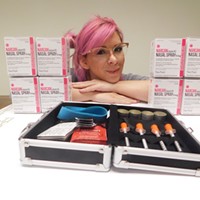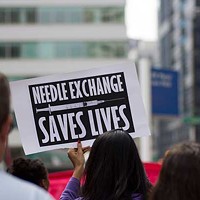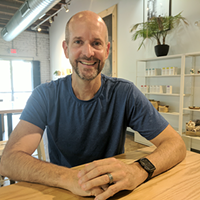How a syringe exchange program could help make addicts, residents and police officers safer
Stuck in the past with drug laws
By Ryan Pitkin @pitkin_ryanOver the last five years, heroin-use rates in Mecklenburg County and the United States have quadrupled. Along with the obvious danger inherent in drug addiction, this epidemic has increased the risk of infection for addicts, police officers or anybody walking the streets of Charlotte.
One local nurse has seen enough.
After watching patients die from HIV, hepatitis C and endocarditis resulting from injecting with dirty needles, Brent Tate, a registered nurse at a local hospital, began researching ideas of how to stop losing people to these preventable conditions.
He has since become an advocate for implementing syringe exchange laws in North Carolina, which would allow drug users to trade used needles for clean ones with no cost and without the risk of criminal charges. Similar programs around the country have cut heroin use by as much as 80 percent in certain cities, and a program in Connecticut is credited for cutting the number of needle-stick injuries to police officers by 66 percent.
Creative Loafing spoke with Tate about how a syringe exchange in Charlotte could help everyone, not just addicts.
What are the most common conditions you come across that are the direct result of using dirty needles?
There are two infections that are the most common: basic abscesses at the injection site are one but the one that's more dangerous is endocarditis, which is a deadly infection of the heart that comes with long-term drug use. That's a pretty big deal.
How do drug laws play a part in the increase of these infections?
Currently the way people get rid of their syringes because of the current law is that they typically inject and then throw them out of their window if they inject in the car and the syringes are just laying around where people who don't use drugs can get injected and infected. Because syringe exchanges are illegal, it promotes that type of behavior. Most of the drug laws in this country promote disease and death. They don't promote health. That's one of the things that a syringe exchange tries to address.
How do current laws put police officers at risk?
It's increasingly dangerous for police officers because people won't declare that they have a syringe on them due to the drug laws in this state. If they have a syringe and there's a little bit of residue in that syringe, they could get a felony for it, so they're not going to tell the officer, they're hoping he won't find it.
In what ways do you see a syringe exchange operating in Charlotte?
First off a syringe exchange has to be legal. Second off, it has to be able to provide other services beside the exchange. That's what you use to get people to come to you, and as you build a relationship with them, if they're interested, you can refer them to other services, whether they want a methadone treatment program or they want to go to detox or they need some sort of housing support, all of those things can be incorporated in the syringe exchange, and they typically are in ways that reduce drug use.
What objections to a syringe exchange program have you heard?
A lot of people are afraid that it's going to increase drug use and if you make it easier for people then more people will do it and get addicted and get sick and die and that's actually not true. Syringe exchange is legal in a lot of places around the country and other countries and it's been shown to decrease drug use and rates of addiction along with the number of infections. It's an understandable objection because it seems like it should work that way but in reality it doesn't.
Speaking of...
Latest in Newsmakers
More by Ryan Pitkin
-

You're the Best... of Charlotte
Oct 27, 2018 -

Listen Up: Cuzo Key and FLLS Go 'Universal' on 'Local Vibes'
Oct 25, 2018 -

Listen Up: KANG is Back and Bla/Alt on 'Local Vibes'
Oct 18, 2018 - More »
Calendar
-

Queen Charlotte Fair @ Route 29 Pavilion
-

NEW WINDOW GALLERY-Pat Rhea-ACRYLIC PAINTINGS-April 05-30 2024 VALDESE, NC 28690 @ New Window Gallery/Play It Again Records
- Through April 30, 12 p.m.
-

TheDiscountCodes
-

Wine & Paint @ Blackfinn Ameripub- Ballantyne
-

Face to Face Foundation Gala @ The Revelry North End















